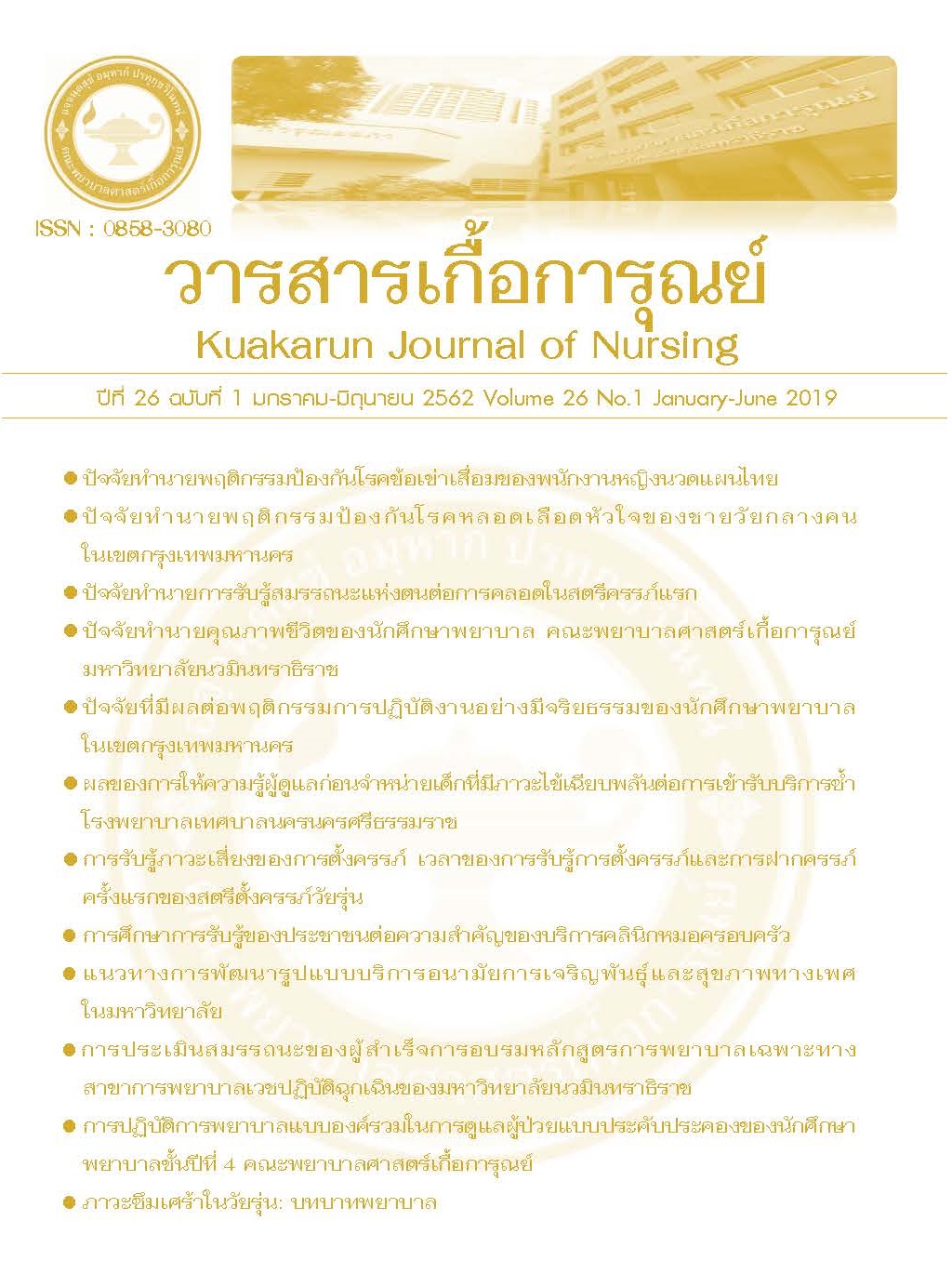ปัจจัยที่มีผลต่อพฤติกรรมการปฏิบัติงานอย่างมีจริยธรรมของนักศึกษาพยาบาลในเขตกรุงเทพมหานคร
คำสำคัญ:
พฤติกรรมการปฏิบัติงานอย่างมีจริยธรรม, ประสบการณ์ด้านปฏิสัมพันธ์เชิงถ่ายทอดทางวิชาชีพ, แบบอย่างด้านจริยธรรมจากบิดามารดา, ความฉลาดทางอารมณ์, เจตคติต่อพฤติกรรมการพยาบาลบทคัดย่อ
การวิจัยนี้ เป็นวิจัยเชิงปริมาณ มีวัตถุประสงค์เพื่อ (1) ศึกษาความสัมพันธ์ระหว่างปัจจัย ที่มีผลต่อพฤติกรรมการปฏิบัติงานอย่างมีจริยธรรมของนักศึกษาพยาบาล และ (2) ศึกษาปัจจัยทำนายพฤติกรรมการปฏิบัติงานอย่างมีจริยธรรมของนักศึกษาพยาบาล โดยใช้แนวคิดทฤษฎี ต้นไม้จริยธรรมของดวงเดือน พันธุมนาวิน เป็นกรอบแนวคิดในการวิจัย กลุ่มตัวอย่าง ได้แก่ นักศึกษาหลักสูตรพยาบาลศาสตรบัณฑิต ชั้นปีที่ 4 ของคณะพยาบาลศาสตร์และวิทยาลัยพยาบาลทั้งภาครัฐและเอกชน ในเขตกรุงเทพมหานคร จำนวน 400 คน โดยใช้วิธีการสุ่มตัวอย่าง แบบง่าย เครื่องมือที่ใช้ในการเก็บรวบรวมข้อมูลคือ แบบสอบถามจำนวน 5 ด้าน ได้แก่ ด้านพฤติกรรมการปฏิบัติงานอย่างมีจริยธรรมของนักศึกษาพยาบาล ด้านประสบการณ์ ด้านปฏิสัมพันธ์เชิงถ่ายทอดทางวิชาชีพ ด้านแบบอย่างด้านจริยธรรมจากบิดามารดา ด้านความฉลาดทางอารมณ์ และด้านเจตคติต่อพฤติกรรมการพยาบาล ได้รับการตรวจสอบคุณภาพเครื่องมือด้านความตรงเชิงเนื้อหาโดยผู้เชี่ยวชาญ และได้ค่าสัมประสิทธิ์แอลฟาของ ครอนบาค เท่ากับ .800, .902, .751, .851, และ .867 ตามลำดับ การวิเคราะห์ข้อมูลใช้ค่า สัมประสิทธ์สหสัมพันธ์ของเพียร์สัน และ การวิเคราะห์การถดถอยพหุคูณแบบขั้นตอน
ผลการวิจัยพบว่า อายุ เกรดเฉลี่ยสะสม และภูมิลำเนาไม่มีความสัมพันธ์กับพฤติกรรม การปฏิบัติงานอย่างมีจริยธรรมของนักศึกษาพยาบาล แต่เพศมีความสัมพันธ์เชิงลบอย่างมีนัยสำคัญทางสถิติที่ระดับ .05 (r = .101) ส่วนเจตคติต่อพฤติกรรมการพยาบาล ความฉลาด ทางอารมณ์ แบบอย่างด้านจริยธรรมจากบิดามารดา และประสบการณ์ด้านปฏิสัมพันธ์เชิงถ่ายทอดทางวิชาชีพมีความสัมพันธ์เชิงบวกกับพฤติกรรมการปฏิบัติงานอย่างมีจริยธรรมของนักศึกษาพยาบาลอย่างมีนัยสำคัญทางสถิติที่ระดับ .01 (r = .546, .495, .477 และ.437 ตามลำดับ) และพบว่า เจตคติต่อพฤติกรรมการพยาบาล ความฉลาดทางอารมณ์ แบบอย่างด้านจริยธรรมจากบิดามารดา และประสบการณ์ด้านปฏิสัมพันธ์เชิงถ่ายทอดทางวิชาชีพสามารถร่วมกันทำนายพฤติกรรมการปฏิบัติงานอย่างมีจริยธรรมของนักศึกษาพยาบาลได้ คิดเป็นร้อยละ 39.80 (R2 = 0.398) โดยเจตคติต่อพฤติกรรมการพยาบาลมีอิทธิพลมากที่สุด (Beta = .306) ข้อเสนอแนะจากการวิจัย คือ ผู้บริหารของสถาบันการศึกษาพยาบาลและอาจารย์พยาบาล
ควรมีการส่งเสริมสนับสนุน และจัดโครงการเพื่อเสริมสร้างประสบการณ์และลักษณะทางจิตที่ พึงประสงค์ ทั้งในและนอกหลักสูตรเพื่อให้นักศึกษาพยาบาลได้มีพฤติกรรมการปฏิบัติงานอย่างมีจริยธรรมและให้การพยาบาลได้อย่างมีคุณภาพ
เอกสารอ้างอิง
พยาบาลทหารบก, 15(3), 18-23.
ปาริชาติ ธีระวิทย์. (2561). การเสริมสร้างคุณธรรมสำหนับนักศึกษาระดับอุดมศึกษาในศตวรรษที่ 21. วารสาร
เทคโนโลยีภาคใต้, 11(1), 31-39.
ภัทริน ภัทรกำพล. (ม.ป.ป.). “บทบาทของครอบครัวต่อการพัฒนาจริยธรรมของเด็ก” กรณีศึกษา: ครอบครัว
ชาวพุทธ. (รายงานการวิจัย). มหาวิทยาลัยมหิดล, วิทยาลัยศาสนศึกษา.
มณี อาภานันทิกุล, วรรณภา ประไพพานิช, สุปาณี เสนาดิสัย และพิศสมัย อรทัย. (2557). จริยธรรมในการ
ปฏิบัติการพยาบาลของพยาบาลไทยตามการรับรู้ของผู้บริหารทางการพยาบาล. วารสารสภาการ
พยาบาล, 29(2), 5-20.
ดวงเดือน พันธุมนาวิน. (2543). ทฤษฎีต้นไม้จริยธรรม: การวิจัยและพัฒนาบุคคล (พิมพ์ครั้งที่ 3).
กรุงเทพฯ: สํานักพิมพ์แห่งจุฬาลงกรณ์มหาวิทยาลัย.
นฤมล เอนกวิทย์, ทัศนีย์ บุญเติม, จารุวรรณ กุลดิลก และมกราพันธุ์ จูฑะรสก. (2551). การพัฒนาหลักสูตร
จิตตปัญญาศึกษาสำหรับนักศึกษาพยาบาล. วารสารหลักสูตรการเรียนการสอน
มหาวิทยาลัยขอนแก่น. 2(1), 59-70.
มัณฑนา เทพมงคล และมานพ ชูนิล. (2558). การรับรู้วัฒนธรรมองค์การกับความฉลาดทางอารมณ์ที่
พยากรณ์การสื่อสารของพยาบาลและผู้ช่วยพยาบาลกับผู้รับบริการในโรงพยาบาลของรัฐ. ใน มหาวิทยาลัยราชภัฎสวนสุนันทา, สถาบันวิจัยและพัฒนา, รายงานการประชุมวิชาการและการนำเสนอผลการวิจัยระดับชาติและนานาชาติ กลุ่มระดับชาติด้านมนุษย์ศาสตร์และสังคมศาสตร์ ครั้งที่ 7 (น 387-397). กรุงเทพฯ: สถาบันวิจัยและพัฒนา
มยุรี ลี่ทองอิน และสิริมาศ ปิยะวัฒนพงศ์, (2558). ปัจจัยร่วมทำนายพฤติกรรมการพยาบาลเอื้ออาทรผู้สูงอายุ
องนักศึกษาพยาบาลในรายวิชาปฏิบัติการพยาบาล, วารสารการพยาบาลและการดูแลสุขภาพ, 33(3), 70-79.
ศิริพร จริวัฒน์กุล, นันทพันธ์ ชินล้ำประเสริฐ, ประณีต ส่งวัฒนา, วรรณี เดียวอิศเรศ, วารุณี ฟองคำ และสม
พร รุ่งเรืองกลกิจ. (2554). วิชาชีพการพยาบาล: ความหมายเชิงเพศภาวะ. วารสารสภาการพยาบาล, 26(2), 26-41.
สภาการพยาบาล. (2559). รายงานประจำปี 2559 สภาการพยาบาล. นนทบุรี: สภาการพยาบาล.
แสงทอง ธีระทองคำ และไสว นรสาร. (2556). กฎหมายสำหรับพยาบาล. สมุทรปราการ: ออฟเซ็ต พลัส.
อนัญญา คูอาริยะกุล, วราภรณ์ ยศทวี, นัยนา อินธิโชติ, วิภาวรรณ นวลทอง และวีระยุทธ อินพะเนา.
(2555). เจตคติต่อวิชาชีพการพยาบาลของนักศึกษาพยาบาล วิทยาลัยพยาบาลบรมราชชนนี อุตรดิตถ์. วารสารวิจัยทางวิทยาศาสตร์สุขภาพ, 6(1), 18-26.
Bastable, S. B., Garmet, P., Jacobs, K. & Sopczyk, D. L. (2012). Health Professional as
Educator Principles of Teaching and Learning. Massachusetts: Jones & Baetlett Pubishers.
Cochran, W. G. (1977). Sampling techniques (3rd ed.). New York: John Wiley & Sons.
Grady, C., Danis, M., Soeken, K. L., O’Donnell, P., Taylor, C., Farrar, A. & Ulrich, C. M. (2008).
Does Ethics Education Influence the Moral Action of Practicing Nurses and Social
Workers? American Journal of Bioethics, 8(4, 4-11.)
Kohlberg, L. & Hersh, R. H. (1997). Moral development: A review of theory. Morel
Development, 16(2), 53-59.
Newport, F. (2012). Congress retains low honesty rating: Nurses have highest honesty rating;
car salespeople, lowest. Gallup, December 3, 1. Retrieved from https://news.gallup.com/poll/159035/congress-retains-low-honesty-rating.aspx

















